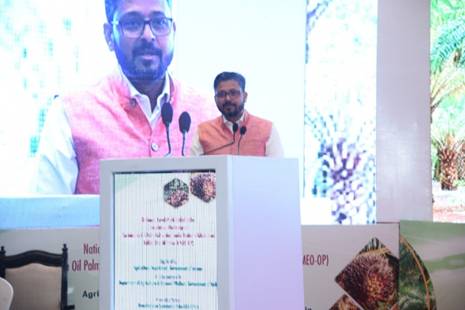
The Union government asked all stakeholders to come together to ensure that share of domestically produced palm oil is increased from existing share of 2% to 20% in next 5-6 years.
Secretary, DA&FW, Government of India, Dr. Devesh Chaturvedi highlighted the importance of Oil palm cultivation to achieve the national objective of achieving atmnirbharta in edible oil production to ensure country’s food security and asked all stakeholders to come together to ensure that share of domestically produced palm oil is increased from existing share of 2% to 20% in next 5-6 years.
Two Day National Level Review and Workshop on Sustainable Oil Palm Cultivation, organized by the Department of Agriculture, Assam in collaboration with the Department of Agriculture and Farmers’ Welfare (DA&FW), Government of India, concluded in Guwahati.
The event brought together key stakeholders from government bodies, private companies, farmers, and international organizations to exchange global best practices and advance sustainable oil palm cultivation in India.
In the lead-up to the workshop, an interaction session with farmers and oil palm industry representatives were organised addressing challenges and discussing best practices in the oil palm sector.
Oil palm farmers from various parts of country, as well as industry representatives participated in the interaction sessions.
This was followed by a physical and financial review of state performance to identify bottlenecks in the implementation of national Mission on Edible Oil, Oil Palm (NMEO-OP ) with State government representatives, helping shape future actions to improve implementation efficiency.
Addressing the Conference, Minister of Agriculture, Assam Shri Atul Bora emphasized the strategic importance of sustainable oil palm cultivation for the region’s economy and assured farmers of the government’s continued support. He stressed Assam’s role in spearheading India’s sustainable oil palm sector. In whole of the Northeast as well as in the country.
Initiating the discussion, Joint Secretary (Oilseeds), DA&FW Shri Ajeet Kumar Sahu explained in details about the implementation issues of NMEO-OP, emphasizing collaboration between states, farmers, and industry to overcome the challenges.
In the beginning Smt. Aruna Rajoria, Agriculture Production Commissioner, Assam, welcomed all the delegates and underscored the state’s leadership in promoting sustainable oil palm practices, particularly in the Northeast.
Chairman of the Commission for Agricultural Costs and Prices (CACP), Shri Vijay Paul Sharma focused on the economic impact of oil palm cultivation, linking role of technology and sustainable practices to enhanced profitability.
A key session chaired by Shri Sanjay Agrawal, former Secretary DA&FW, examined the implementation challenges of NMEO-OP. He urged greater coordination between government bodies, industry leaders, and farmers to accelerate oil palm production, with panel discussions addressing policy and implementation bottlenecks.
The workshop showcased technological advancements, including Shell Gene technology, to improve sapling quality and oil yields.
A major focus was placed on ensuring the availability of high-quality planting material, a critical factor for the success of oil palm cultivation.
Additionally, health and nutritional aspects of palm oil were discussed, tackling misconceptions and highlighting its benefits.
International experts, including representatives from the Council of Palm Oil Producing Countries (CPOPC), provided insights on global trends and regulatory developments in palm oil cultivation.
The Roundtable on Sustainable Palm Oil (RSPO) and World Wide Fund for Nature (WWF) contributed to discussions on sustainability and climate resilience, sharing strategies for India to adopt sustainable practices and avoid the environmental pitfalls experienced in other regions.
Industry leaders such as Godrej Agrovet Ltd (GAVL), 3F Oil Palm Pvt Ltd, Patanjali Foods Ltd (PFL), and AAK actively participated, sharing their experiences in the oil palm value chain.
Their insights highlighted the role of the private sector in scaling up sustainable oil palm production in India, particularly through public-private partnerships.
The collaboration of policymakers, industry leaders, farmers, and international experts laid a strong foundation for the future of oil palm production in India, balancing growth with environmental responsibility across the value chain.



